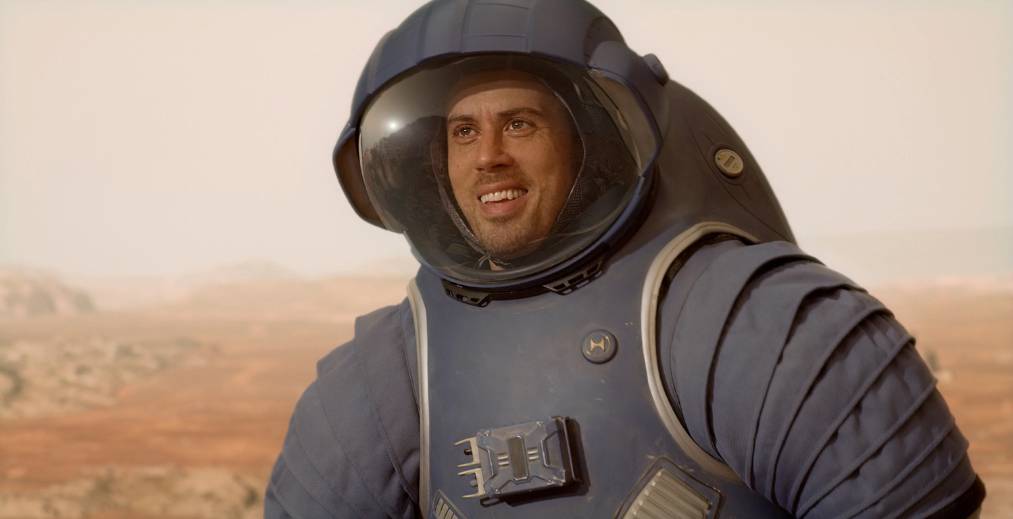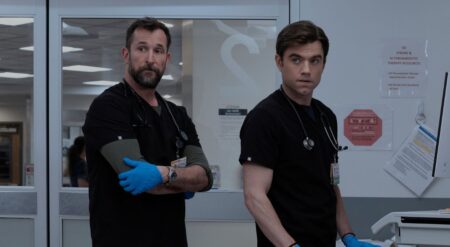For All Mankind didn’t seem like a show I would care about when it was first released. An alternative history on what would have happened if the Russians had won the space race and the US didn’t give up on science because of it. It’s intriguing but not something that screams “great sci-fi.” Then I finally watched. Now I’m hooked on the series. With that, For All Mankind Season 4 is the most the series has gone into traditional science fiction than we’ve seen.
Created by Ronald D. Moore, Ben Nedivi, and Matt Wolpert, the 10-episode fourth season puts audiences and our characters into the new millennium. For All Mankind Season 4, it has been eight years since Season 3, and Happy Valley has rapidly expanded its footprint on Mars. It’s no longer a lone outpost relying on a resupply in over a year. Instead, seven countries, including North Korea, Russia, and the US, have joined forces to create a thriving colony for exploiting the planet’s resources.
Now, in 2003, the focus of the space program has turned to the capture and mining of extremely valuable, mineral-rich asteroids that could change the future of both Earth and Mars. But simmering tensions between the residents of the now-sprawling international base threaten to undo everything they are working towards. The series has some returning cast like Joel Kinnaman, Wrenn Schmidt, Krys Marshall, Edi Gathegi, Cynthy Wu, and Coral Peña. But it also adds Toby Kebbell, Tyner Rushing, Daniel Stern, and Svetlana Efremova as series regulars.

For All Mankind Season 3 ended with a gut punch. While the series’ thrives on melodrama, that absurdity carries impact. Season 4 opens with how everyone has and does deal with their trauma. Ed Baldwin (Joel Kinnaman) has lost everyone. He lost his ex-wife, who was still his close friend, at the end of last season. He lost his son at the end of Season 1. And both traumatic moments happened while he was in space. Now, he can’t seem to find a way back. Space is safe, and Earth is empty.
This is especially true after what he and the other members of the Mars team chose to do with Danny Stevens (Casey W. Johnson) last season, leaving him exiled and alone. Danielle Poole (Krys Marshall) reluctantly takes a position of command after spending some time back home with her family on Earth. While she is capable, unlike Ed, she doesn’t want to be on Mars. There, her past choices haunt her.
Those are our astronauts, the ones we’ve been with in Season 1, and those who keep moving forward despite everything that has happened to them. Because we’ve seen them over multiple decades now, their age is showing through their old-age makeup. While Danielle’s is passable, Ed’s is pretty distracting, especially his prosthetic tummy. It’s not a fat suit, but a prosthetic to showcase his loss of athleticism in his older age. He’s thinner than we’ve seen him, and with a tremor creeping in, his place in the series is all about feeling useful again.
He is going to lose his ability to fly. He has lost his ability to command. And now, all he can do is help organize the workers under him at Helios to push for something more. But he isn’t pushing them in order to get them a better living wage and safety bonus. He is doing it to feel like he is needed. He, like many old men, is just looking for something to do.
His trajectory as a character is a fascinating one. Kinnaman’s Ed rose quickly as one of my favorites in the series. His arrogance was charismatic, and his dedication to pushing forward through any manner of failing was admirable. But then he started falling from his heroism and is now closer to being a washed-up man on Earth than an astronaut in the sky, even though he is on Mars.
Back on Earth, Aleida Rosales (Coral Peña) is suffering from deep PTSD to the point that she leaves NASA. She is debilitated after the bombing of the Space Station, and she is trying to be okay. A mother of a teen now and having lost so much time with her family, Aleida is hoping to find a future again but is not willing to confront the trauma and grief of having to lose so many she held close.

A betrayal of that grief is the fact that Margo (Wrenn Schmidt) is still alive. Speaking Russian with the thickest Southern twang, her laughable accent is actually perfect. Instead of fitting into the country she unwillingly defected to, Margo consistently sticks out. She isn’t at home, never truly, and in For All Mankind Season 4, she carries the weight of her mistakes with no ability to contextualize them. Ultimately, it pushes her into a corner even when she meets Aleida again. Their reunion is both a fantastic relief and a devastating moment when Aleida’s anger starts to rise.
The complexity of Margo’s situation and her enduring connection to Aleida is the most interesting thing happening on Earth, even more than Helio’s push to colonize Mars. Their mentorship relationship is strained but ever-present. Over the course of the last episodes of the season, the women realize that they are all each other has.
Outside of the political intrigue between Margo’s plays with the Russians as she begins to work for Star City and the Helios of it all, the season also brings forward a more centered focus on what space travel means for mankind in a world where it has become commonplace. For one, landing on an asteroid isn’t about testing if it can be done. Instead, it’s about mining it for resources and pushing the capitalist goal of more minerals for more money further. But even landing on an asteroid has lost its shine. It isn’t some grand feat of science but a cog in the machine.
For All Mankind moves into the future by about a decade each season. In doing so, this alt-history sci-fi story moves further and further away from what we know history to be. It’s natural for this to happen. One change makes the ripples get larger and more impactful, and in For All Mankind Season 4, we’ve hit the most sci-fi the series has ever been. Only in doing so is it moving the world away from the wonder and awe of space travel and toward the banality of it.

One of my favorite examples of space becoming something normal is how it is adapted with capitalism as the main lens. This was always how things would go, and last season’s introduction of Helios was proof of that. Space travel and Mars have been stripped of their shine as Earth has taken more and more from it. To ground this, the series highlights how Dianna and Ed deal with this new reality. But it also introduces Miles Dale (Toby Kebbell), a working-class guy who used to work on oil rigs. Lacking an education and a field of work since space travel made fossil fuels unnecessary, he desperately needs money for his family.
Look, I don’t like Dale. I really do not like this man, and every choice he makes makes me dislike him even more. Earth’s problems and exploitation are exported to Mars as much as its technology. The key among them is desperation to make money to survive, and then they always want to get more. Mars isn’t the dream anymore in terms of exploration. Instead, it’s a dream to get out of poverty by signing away years of your life. Dale and the crew of Happy Valley demonstrate this, and on Earth, the constant bombardment of hiring propaganda from Helios does, too.
For All Mankind Season 4 is able to pull off its signature ending. It’s not a cliffhanger but rather a glimpse into the future. The ability of the series to constantly look forward at the end of every season is astounding. It’s a vibrant take on storytelling that closes the current story but leaves the door wide open for something more. As a whole, this season marked a stark shift in what space means to Americans and how all roads will always lead back to “make more money.” While some melodramatic choices don’t always land this season, this alt-history story remains a fantastic exercise in pulling the thread of sci-fi directly against Americans and how they think of themselves. In fact, the things that remain the same continue to speak louder than things that have changed.
Having moved the farthest away from current technology, For All Mankind Season 4 is perhaps the most sci-fi forward of the series. Still, it embraces the banality of space. It takes the grand wondrous horizon, flattens it under the boot of capitalism, and continues forward.
For All Mankind Seasons 1 – 4 are streaming now on Apple TV+.
For All Mankind Season 4
-
Rating - 8/108/10
TL;DR
Having moved the farthest away from current technology, For All Mankind Season 4 is perhaps the most sci-fi forward of the series. Still, it embraces the banality of space.







